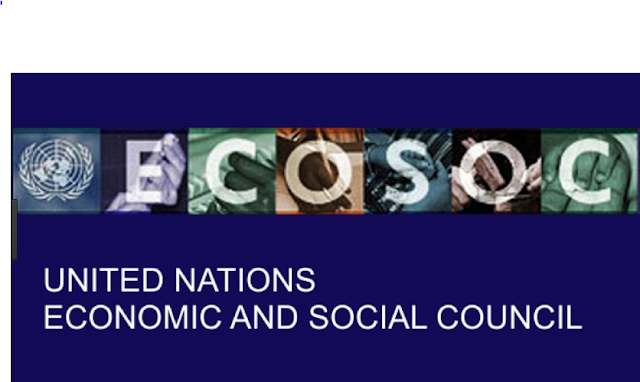THE ECONOMIC AND SOCIAL COUNCIL
The Economic and Social Council was established by the Charter as the principal organ to coordinate the economic and social work of the United Nations and the specialised agencies and institutions-known as the ”United Nations family” of organisations.
The Council has 54 members Who serve for three years, 18 being elected each year for a three-year term to replace 18 members Whose three-year term has expired.
Voting in the Economic and Social Council is by simple majority, each member has one vote.
Charter Role
The functions and powers of the Economic and Social Council are:
- To serve as the central forum for the discussion of international economic and social issues of a global or interdisciplinary nature and the formulation of policy recommendations on those issues addressed to member states and to the United Nations system as a whole;
- To make or initiate studies and reports and make recommendations on international economic, social, cultural, educational, health and related matters;
- To promote respect for, and observance of, human rights and fundamental freedoms for all;
- To call international conferences and prepare draft conventions for submission to the General Assembly on matters falling Within its competence
- To negotiate agreements with the specialised agencies defining their relationship with the United Nations
- To coordinate the activities of the specialised agencies by means of consultations with and recommendations to them, and by means of recommendations to the General Assembly and the Members of the United Nations;
- To perform services, approved by the Assembly, for Members of the United Nations and, upon request, for the specialised agencies;
- To consult with non-governmental organisations concerned, on matters with which the Council deals.
Sessions
The Economic and Social Council generally holds two-month long sessions each year, one in New York and the other at Geneva. The year-round work of the Council is carried out in its subsidiary bodies commissions and committees which meet at regular intervals and report back to the Council.
Subsidiary Bodies of un
- The subsidiary machinery of the Council includes: (a) Five Regional Commissions: Economic COmmission for Africa (headquarters in Addis Ababa, Ethiopia), Economic and Social Commission for Asia and the Pacific (Bangkok, Thailand), Economic Commission for Europe (Geneva, Switzerland), Economic Commission for Latin America and the Caribbean (Santiago, Chile) and Economic and Social Commission for Western Asia (Baghdad, Iraq)
- Nine Functional Commissions: Statistical Commission, Population Commission, Commission for Social Development, Commission on Human Rights, Commission on the Status of Women, Commission on Narcotic Drugs, Commission on Crime Prevention and Criminal Justice, Commission on Sustainable Development, Commission on Science and Technology for Development,
- Four Standing Committees: Committee for Programme and Coordination, Committee on Non-governmental Organisations and on Negotiations with Inter-govemmental Agencies; Commission on Human Settlement;
- A number of standing expert bodies on such subjects as crime prevention and control, development planning, international cooperation in tax matters and transport of dangerous goods.
;All five regional commissions were established according to similar terms of reference to function in an analogous manner in their respective regions. Their main objective in to initiate and participate in measures for facilitating concerted action for economic and social development in order to raise the level of economic activity and advance the level of living and to maintain and strengthen economic relations among their members and other countries of the world. The commissions may, after discussions with any specialised agency functioning in the same general field, and with the approval of the council, establish such bodies as they deem appropriate in order to facilitate the carrying out of their responsibilities.

.png)







No comments:
Post a Comment